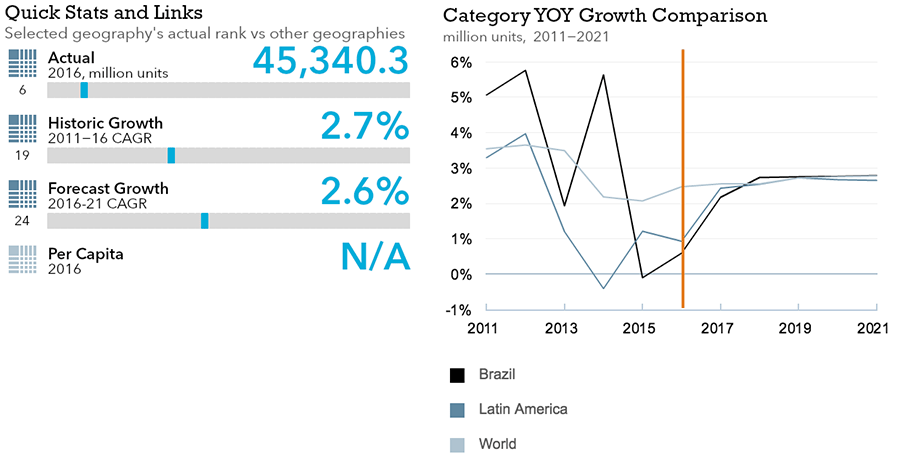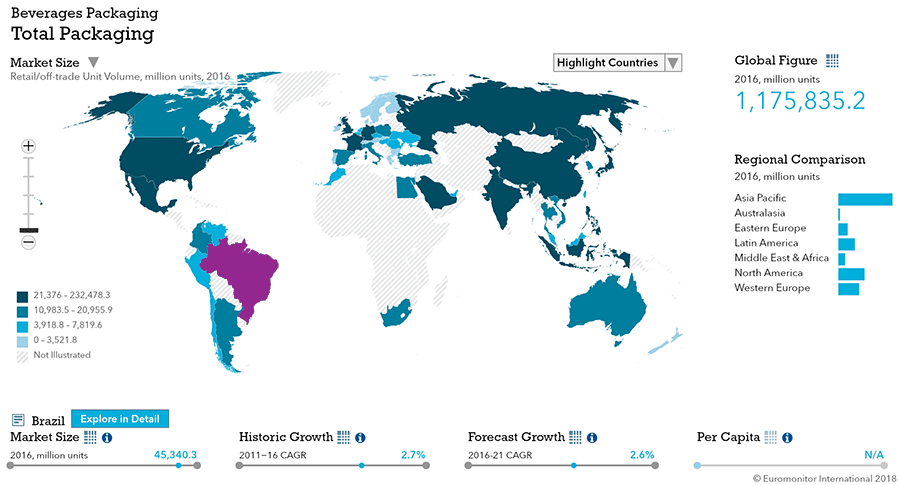Flexible Packging Landscape

- Alcoholic drinks packaging register a decline of 1%, reaching total volume of 37.4 billion units.
- Soft drinks packaging records 1% total volume growth in 2016, and will likely see CAGR of 3%.
Trends
- 2% fall in beer’s total volume sales negatively impacted metal beverage cans. Glass bottles increased slightly, particularly small bottles and multipacks increased, leveraged by beer and malt-based RTDs sales
- Soft drinks packaging has been negatively affected by the economy, with many beverage categories undergoing severe market reductions. Industry polarization benefits small pack sizes in PET bottles and liquid cartons and family-sizes
- Although sales of cachaça (typical Brazilian spirit) continue to shrink, the product represents 76% of the category’s total volume sales in 2016. The migration to other types of distilled beverages and other emerging products like RTDs/high-strength premixes, continue to negatively affect sales of economy and standard cachaça.
- Sales of alcoholic drinks through atacarejo outlets represented 11% of total sales in 2016, and is expected to increase.
- Sales of bigger pack sizes benefited from more attractive prices per unit and small/individual-sized packs gave focused positioning on indulgence products or niche premium brands.
- 100% juice was the most dynamic packaging category in 216 with 19% increase in total volume units. PET bottles registered total volume growth of 29%.
- Shaped liquid cartons also performed well in 100% juice with an 18% total volume growth rate, leveraged particularly by 330ml and 1,000ml.
- Liquid cartons registered positive volume growth of 3% in 2016, especially through shaped versions for on-the-go consumption.
- Mineral bottled water ranked second in volume growth, at 7%. Sales of small PET bottles and thin-wall plastic cups benefited from low unit price and practical packaging.
- Flexible packaging registered a growth rate of 4%, leveraged by powder concentrates.
Outlook
- Alcoholic drinks packaging is expected to register 1% total volume CAGR. Glass bottles will lose unit shares to metal cans but see a 1% CAGR.
- Soft drink packaging is expected to have a CAGR of 3%, reaching 43.2 billion units in 2021.
- Liquid cartons should remain the most dynamic packaging types, with an expected CAGR of 4% to 2021. This should be driven by sales of 100% juice, coconut and other plant waters, and RTD tea. Brick liquid cartons will register the most positive performance, but shaped and gable-top versions are expected to emerge and consolidate. Wine also drives growth in shaped liquid cartons and metal packaging, both expected to grow at 8% and 12% CAGR respectively.
- Glass bottles should see a CAGR of 5%, leveraged by sales of 100% juice and premium still bottled water (particularly for foodservice).
Disclaimer
This database attempts to compile data from numerous sources. Users should be aware that because different sources are used, there could be errors or omissions. The user accepts that the information is only intended to be an initial reference. The user understands that there is no assurance that this reference material is error free, and that no one involved in compiling or distributing this reference material shall be liable for any damages arising out of its use. Commercially important information should be rechecked and verified with knowledgeable parties in the country of interest.

